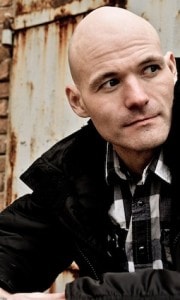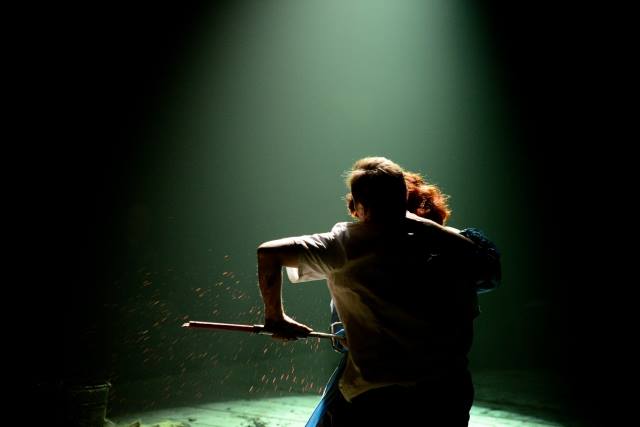CHICAGO: The Hypocrites’ founding artistic director, Sean Graney, announced this week that he’ll return to the helm of the company after just three years away, during which time he was mostly in Cambridge, Mass., at the Radcliffe Institute for Advanced Study at Harvard. In the interim, longtime Hypocrites member Halena Kays led the company.
It was a dramatic move that made us wonder: Was there more to the story? Turns out there is, but it’s mostly good news. We spoke to Graney about why he left the company he founded, and why he’s back so soon.

American Theatre: So was coming back secretly your plan all along?
Sean Graney: It definitely was not the plan when I left. I wasn’t sure where I was going to end up. There was a lot about running a small arts organization that didn’t suit my nature at the time. And in the meantime, Halena has made a lot of improvements in the areas of fundraising and community-building and internal relationships in the company. When I came back to the company to do All Our Tragic last year, I was talking to her about her frustrations with balancing the financial and artistic sides of the job and her personal life—she has a two-year-old—and we talked about what a transition might look like.
In a profile of you in our Dec. ’13 issue, Kris Vire quoted you as saying, “I’m a decent director, but I’m not a good artistic director.”
Absolutely—thank you for remembering that! (Laughs) In the past three years, I learned more about what a good artistic director is and I’m excited about that challenges. At the time I liked being a director; I didn’t like running a theatre. I was at a place in my life when I didn’t want anybody to tell me to do anything. I think I got over that.
So I’m excited now about the responsibilities and challenges of running a theatre, and I’m excited to get to be able to fix some of the mistakes I put into the DNA of the institution. It’s about trying to institutionalize an arts organization that was established by a 24-year-old, anti-establishment, punk-rock kid. So there are a lot of negative things associated with that energy, and I’m excited to shake them out. I’m excited about board development, and to continue to build relationships with our donors and patrons.
That’s not something I hear a lot. You really have changed!
Well, the main thing I worked on while I was away All Our Tragic. It sounds so stupid, but that sort of changed my life, and reconnected me to the power of theatre and the community around theatre. In the way it developed and the way we worked on it, 100 people added their voices to this one script. It sort of opened my eyes to a very non-selfish way of creating theatre that was exciting.
It sounds like you’ve learned a version of the old saw that leadership is actually a lot about service.
Yeah, I started this company so I could do what I want. Whenever there was conflict or people questioning me, my reply would be: “I started the company! It’s my company! I’m going to do this, and if you don’t like it, tough poop.” Rather than being reasonable. I think leaders are actually led by the people they lead. You have to provide opportunities for people to thrive. How do I create platforms for people to show their best work?
Bottom line, I’m much happier running the company this time.
It’s not like the company has languished in your absence: It’s grown, it’s moved to a new space, it’s had hit shows—at least one of them newly created by you, but still.
The company has just grown in crazy, exciting ways. We just crossed the half-a-million-dollar budget line. Halena made it really easy for me to come back. It’s not like I’m inheriting a shitstorm. She took a slightly dysfunctional company, which is what I gave to her, and brought it into this midsized arts organization with solid productions. It’s actually easy for me to come back because she cleaned up so much of my mess.
So you weren’t thinking, “I’ve got to come back and rescue a sinking ship.”
No. Both Halena and I experienced—burnout is the best way to explain it. When you’re the leader, there’s a lot of blowback with that, and it’s one person beariing the brunt of it. It’s a lot for one person to deal with, especially if you’re also trying to make money directing elsewhere. That’s why we’ve started an artistic council with three other longtime company members, and Halena. We meet once a week and talk about the future, talk about ideas people have, so it doesn’t feel so lonely.
That you developed All Our Tragic while not running the theatre makes me wonder: Are you going to be creating more new work there soon, or will you focus more on running the theatre now?
As we’re talking about the next season, there are not many projects I’m excited about to direct. Right now I’m excited about fostering other artists. Doing All Our Tragic was amazing for me artistically, but it sort of exhausted me for a while. As I think about my future as an artist, there’s nothing really jumping out for me. I know I’m going to get back on the artistic horse again, but as of right now, I don’t have anything that’s burning inside of me to say. I’m putting my creative energy toward further improving the company.
You’ve toured the Gilbert & Sullivan shows around to various theatres. Will that continue to be a goal for the Hypocrites?
We’re one of the only companies in Chicago that has its eye on the national landscape. A lot of productions get sent to New York, but I’m talking about the whole landscape of theatre around the country. It’s more exciting for me to bring a show I made with Hypocrites to another city than just directing for hire. I get to learn the way another theatre works, I get to meet this whole new audience, try new restaurants. So yes, most of the other shows I’m going to make with the Hypocrites, I’ll have my eye on moving them, on seeing if they’re produceable products for other theatres.
I’m glad we spoke, because when we get a press release about an artistic transition, we always wonder if there’s more to the story—some drama and upheaval that’s not being talked about.
I was nervous about that, and so was Halena; we don’t want it to seem like there was a problem. By chance, I came back to the theatre with this optimistic, community-building mindset, and some extra money from a grant [bestowed by the Helen Coburn Meier and Tim Meier Charitable Foundation for the Arts]. The artistic director here doesn’t really get paid; we putting in steps to change that. But I came back with time and money and optimism, and Halena had no time or money to do this. So it just came up in conversation. We said: Let’s just switch.
All Our Tragic, a 12-hour rendering of all 32 surviving Greek tragedies, will return to the Hypocrites June 20-Aug. 9.


